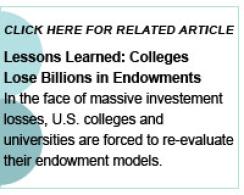In times of crisis it helps to have a friend. In the case of Middlebury College, a small liberal arts school in western Vermont, that friend would be Alice Handy, the founder of outsourced endowment investment firm, Investure. Handy, with 29 years of investment experience at the University of Virginia, opened her firm in 2004 to provide full endowment investment management services to 10 institutions that now include Middlebury, Smith College, Barnard and Dickinson College. Unlike other endowment-style funds, Investure is alone in offering what it calls a consortium model, managing each of 10 endowments separately, while acting as the CIO of each institution.
Having Handy to help out, “Almost feels like a CIO on campus,” agrees Rick Fritz, chairman of the Middlebury board of trustees and a 1968 alum. Fritz, who ran the private equity and venture capital for BancBoston Capital, a subsidiary of Fleet Group, before retiring in 2003, was chair of the investment committee during part of the two to three years that discussions about outsourcing were held. Back in 2005, with only a volunteer committee that met periodically, a growing allocation to private investments, and a portfolio approaching the billion dollar mark, “the endowment required more of a daily touch than quarterly,” recalls Fritz. “We felt the Investure model was best for us as a $700 million endowment.” The trustees considered hiring their own CIO, but ultimately rejected that option. “We thought there were advantages to scale,” and access to better managers, Fritz explains.

Middlebury had 32 percent or $222.2 million of its now $740 million portfolio in private partnerships and another 28 percent or $194.9 million in alternative equity, or hedge funds, at the end of June when the fund was below $700 million. The fund peaked at $950 million in September 2007. Handy plans to reduce unfunded commitments by 3.1 percent through both informal reductions ($6.1 million) and targeted fund size reductions in the secondary market ($15 million). “It’s not like you flip a switch and change your portfolio,” says Handy. “The illiquids take forever.” Handy is carrying more cash than normal to stay on top of volatile markets. Middlebury had a 5 percent allocation or $34.6 million at the end of June.
Middlebury, which draws 22 percent of its operating budget from its endowment was in somewhat better shape than its peers because most of its new plant was completed in the 1990s when the campus grew from 1.5 million square feet to 2.3 million with the addition of an arts center, an arena, a new library and numerous other enhancements. But like other schools, reports CFO Patrick Norton, the school has had to reduce staff by 90, halt new construction, and institute a hiring freeze. The school is also paying off $270 million in tax exempt debt raised to fund its earlier building projects. The CFO credits Handy with reaching out to consortium members to advise on issues outside of her purview, such as problems in the auction rate bond market.
“The downturn strengthened our relationship” with Investure, reports Norton. Investment calls were increased to monthly, rather than three times a year. “I think during last year it probably was more comforting being under the umbrella of an enterprise like Investure than going it alone,” concludes Fritz, who is keeping a close eye on his alma mater from his second home located right across from campus.





